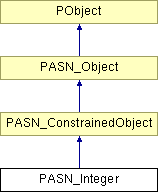
#include <asner.h>
Inheritance diagram for PASN_Integer:

Public Member Functions | |
| PASN_Integer (unsigned val=0) | |
| PASN_Integer (unsigned tag, TagClass tagClass, unsigned val=0) | |
| PASN_Integer & | operator= (unsigned value) |
| operator unsigned () const | |
| unsigned | GetValue () const |
| void | SetValue (unsigned v) |
| virtual Comparison | Compare (const PObject &obj) const |
| virtual PObject * | Clone () const |
| virtual void | PrintOn (ostream &strm) const |
| virtual void | SetConstraintBounds (ConstraintType type, int lower, unsigned upper) |
| virtual PString | GetTypeAsString () const |
| virtual PINDEX | GetDataLength () const |
| virtual PBoolean | Decode (PASN_Stream &) |
| virtual void | Encode (PASN_Stream &) const |
| PBoolean | DecodePER (PPER_Stream &strm) |
| void | EncodePER (PPER_Stream &strm) const |
| PBoolean | IsUnsigned () const |
Protected Attributes | |
| unsigned | value |
| PASN_Integer::PASN_Integer | ( | unsigned | val = 0 |
) |
| PASN_Integer::PASN_Integer | ( | unsigned | tag, | |
| TagClass | tagClass, | |||
| unsigned | val = 0 | |||
| ) |
| PASN_Integer& PASN_Integer::operator= | ( | unsigned | value | ) |
| PASN_Integer::operator unsigned | ( | ) | const [inline] |
| unsigned PASN_Integer::GetValue | ( | ) | const [inline] |
| void PASN_Integer::SetValue | ( | unsigned | v | ) | [inline] |
| virtual Comparison PASN_Integer::Compare | ( | const PObject & | obj | ) | const [virtual] |
Compare the two objects and return their relative rank. This function is usually overridden by descendent classes to yield the ranking according to the semantics of the object.
The default function is to use the CompareObjectMemoryDirect() function to do a byte wise memory comparison of the two objects.
Reimplemented from PObject.
| virtual PObject* PASN_Integer::Clone | ( | ) | const [virtual] |
Create a copy of the class on the heap. The exact semantics of the descendent class determine what is required to make a duplicate of the instance. Not all classes can even { do} a clone operation.
The main user of the clone function is the PDictionary class as it requires copies of the dictionary keys.
The default behaviour is for this function to assert.
Reimplemented from PObject.
| virtual void PASN_Integer::PrintOn | ( | ostream & | strm | ) | const [virtual] |
Output the contents of the object to the stream. The exact output is dependent on the exact semantics of the descendent class. This is primarily used by the standard operator<<# function.
The default behaviour is to print the class name.
Reimplemented from PObject.
| virtual void PASN_Integer::SetConstraintBounds | ( | ConstraintType | type, | |
| int | lower, | |||
| unsigned | upper | |||
| ) | [virtual] |
Reimplemented from PASN_Object.
| virtual PString PASN_Integer::GetTypeAsString | ( | ) | const [virtual] |
Return a string giving the type of the object
Implements PASN_Object.
| virtual PINDEX PASN_Integer::GetDataLength | ( | ) | const [virtual] |
Implements PASN_Object.
| virtual PBoolean PASN_Integer::Decode | ( | PASN_Stream & | ) | [virtual] |
Implements PASN_Object.
| virtual void PASN_Integer::Encode | ( | PASN_Stream & | ) | const [virtual] |
Implements PASN_Object.
| PBoolean PASN_Integer::DecodePER | ( | PPER_Stream & | strm | ) |
| void PASN_Integer::EncodePER | ( | PPER_Stream & | strm | ) | const |
| PBoolean PASN_Integer::IsUnsigned | ( | ) | const |
unsigned PASN_Integer::value [protected] |
 1.5.1
1.5.1